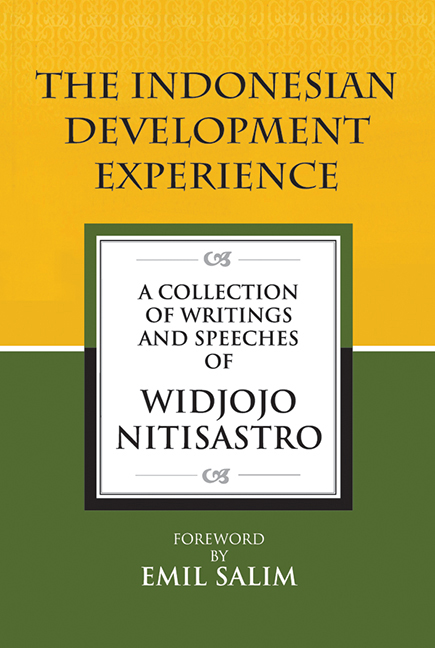Book contents
- Frontmatter
- Dedication
- Frontispiece
- Contents
- Foreword
- Introduction
- Part I PLANNING OF INDONESIA'S DEVELOPMENT
- Part II IMPLEMENTATION OF INDONESIA'S DEVELOPMENT
- Part III FACING VARIOUS ECONOMIC CRISES
- Part IV SETTLEMENT OF FOREIGN DEBT
- Part V EQUITABLE DEVELOPMENT
- Part VI INDONESIA AND THE WORLD
- 26 In the Mutual Interest of Rich and Poor Nations (1982)
- 27 Indonesia Chaired the OPEC Conference in Bali at a Time When Iran and Iraq were at War (1980)
- 28 Fifteen World Economic Phenomena That Stood Out During the Decade of the 1980s (1989)
- 29 Perception of Interdependence But Lack of Meaningful Action (1984)
- 30 Advancing Mutual Understanding and Mutual Confidence (1996)
- Index
- About the Author
30 - Advancing Mutual Understanding and Mutual Confidence (1996)
from Part VI - INDONESIA AND THE WORLD
Published online by Cambridge University Press: 21 October 2015
- Frontmatter
- Dedication
- Frontispiece
- Contents
- Foreword
- Introduction
- Part I PLANNING OF INDONESIA'S DEVELOPMENT
- Part II IMPLEMENTATION OF INDONESIA'S DEVELOPMENT
- Part III FACING VARIOUS ECONOMIC CRISES
- Part IV SETTLEMENT OF FOREIGN DEBT
- Part V EQUITABLE DEVELOPMENT
- Part VI INDONESIA AND THE WORLD
- 26 In the Mutual Interest of Rich and Poor Nations (1982)
- 27 Indonesia Chaired the OPEC Conference in Bali at a Time When Iran and Iraq were at War (1980)
- 28 Fifteen World Economic Phenomena That Stood Out During the Decade of the 1980s (1989)
- 29 Perception of Interdependence But Lack of Meaningful Action (1984)
- 30 Advancing Mutual Understanding and Mutual Confidence (1996)
- Index
- About the Author
Summary
Introductory Note: In 1996 Nihon Keizai Shimbun, the leading economic daily in Japan, established the Nikkei Asia Prizes to promote understanding among countries in the Asia Pacific region. The Nikkei Asia Prize for Regional Growth was awarded to me. In my acceptance speech during the award ceremony in Tokyo, Japan, on 15 May 1996, I said that I considered the honour conferred upon me “… as an expression of appreciation and confidence in my country, its people and its government. …” and that “My role has been limited to contributing in a small way to advancing mutual understanding and mutual confidence.” Referring to Indonesia's history of the last thirty years, I enumerated a few requirements to bring about a fundamental economic transformation: “… a national resolve, a determined leadership, clear directions, and full commitments to put your own economic house in order and to live in peace with your neighbours. The next requirement is a sympathetic understanding by other nations and a readiness on their part to develop an effective and mutually advantageous economic cooperation.”
Nihon Keizai Shimbun under the leadership of Mr Takuhiko Tsuruta has established the Nikkei Asia Prizes to promote understanding among countries of the Asia Pacific Region. It is a great honour for me to be awarded the Nikkei Asia Prize for Regional Growth and I would like to take this opportunity to express my deep appreciation to Nihon Keizai Shimbun.
My profound thanks also goes to all members of the Selection Committee under the chairmanship of Mr Gaishi Hiraiwa. To be chosen by the distinguished Selection Committee from among so many eminent persons in Asia who left their marks in promoting regional growth is truly an exceptional distinction for me.
Allow me to look upon this distinguished honour conferred upon me as an expression of appreciation and confidence in my country, its people and its government for their endeavours to promote regional growth and regional cooperation. My role has been limited to contributing in a small way to advancing mutual understanding and mutual confidence.
On this auspicious occasion perhaps I could share with you some of my thoughts on regional growth and regional cooperation. In developing a vision of the future it seems appropriate to ask ourselves what can be learned from the past.
- Type
- Chapter
- Information
- The Indonesian Development ExperienceA Collection of Writings and Speeches, pp. 324 - 328Publisher: ISEAS–Yusof Ishak InstitutePrint publication year: 2011

